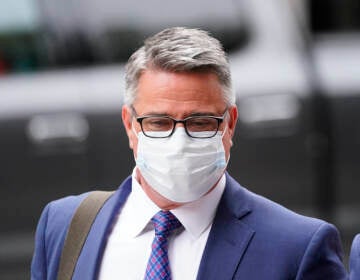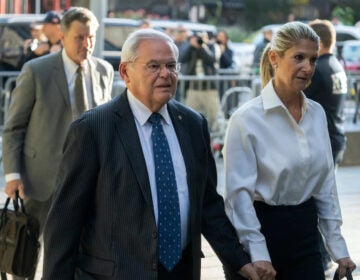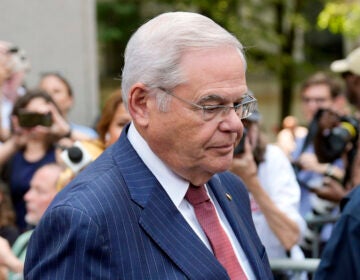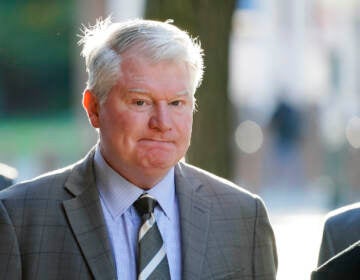Corruption trial continues as Councilmember Bobby Henon’s lawyer drills into fundraising
Among the character witnesses called for Henon were former nurses union president Patricia Eakin and Michael Bresnan, president of the firefighters and paramedics union.
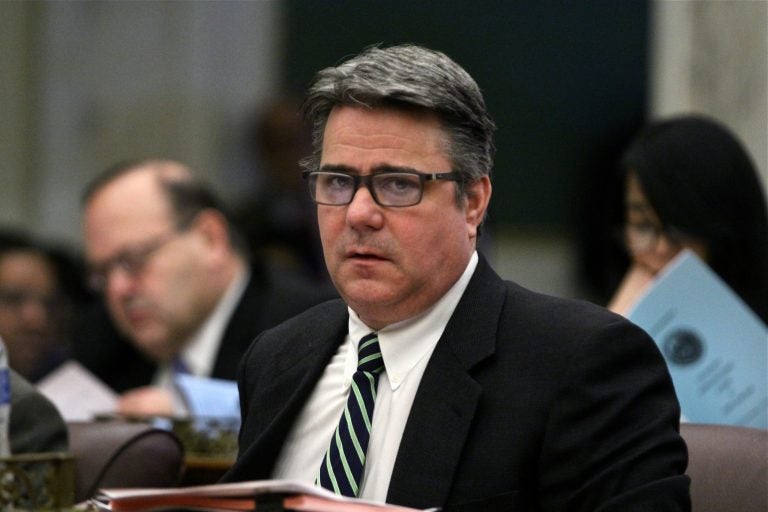
Philadelphia City Councilmember Bobby Henon. (Emma Lee/WHYY)
City finance director Rob Dubow testified in the corruption trial of City Councilmember Bobby Henon and electricians union head John “Johnny Doc” Dougherty Thursday to discuss their role in the passage of Philadelphia’s soda tax in 2016.
The suggestion that Mayor Jim Kenney pushed for the tax to help Dougherty get retribution against the Teamsters union, whose members include beverage industry drivers, so concerned Dubow that he wrote a newspaper editorial to refute that idea, he said.
The article by Dubow and Kenney’s chief of staff Jim Engler was published in February 2019, a few days after Dougherty, head of IBEW Local 98, was indicted for allegedly bribing Henon to support the tax in council and take other official actions.
Opponents of the tax in the beverage industry “will no doubt seize on this purported linkage to the federal probe,” they wrote in the article. “So we write to make the record absolutely clear: The mayor didn’t get the idea to implement the tax from Local 98 business manager John Dougherty.”
“It was important for us for people to know why we wanted these revenues,” Dubow said Thursday. “They were for important programs.” They included pre-kindergarten programs and Rebuild, an initiative to renovate parks, recreation centers, and libraries.
Dubow was called to the witness stand by Dougherty’s attorney Henry Hockeimer, who has tried to chip away at prosecutors’ contention that Henon supported the sweetened beverage tax to help Dougherty with his union rivalry. Hockeimer has argued that Dougherty got behind the levy because it was a good policy favored by his close ally Kenney.
“In general he was supportive and helpful, and helped advocate for it,” Dubow said of Dougherty. He also acknowledged that Henon was an early advocate for reviving the soda tax proposal in 2015, before the issue with the Teamsters came up.
Fundraising or bribery?
Dubow testified as the trial reaches the end of its fifth week, following the prosecution’s resting of its case on Tuesday and Judge Jeffrey Schmehl’s dismissal of one charge against Dougherty relating to a proposed audit of the Philadelphia Parking Authority.
The jury also heard testimony from Rachel Doran, a political fundraiser with Rittenhouse Political Partners who has worked for Henon’s campaigns for several years. She was asked about a fundraising call Henon made from her office in September 2015, when he was running for reelection.
The call between Henon and Jim Gardler, president of the Communication Workers of American Local 13000, has been played a few times over the course of the trial. It is a central element to charges that CWA gave Henon $13,000 in campaign contributions as a bribe for holding a council hearing that provided negative publicity for Verizon. CWA was striking against Verizon at the time.
Henon called Gardler, asked for a $10,000 contribution to his campaign, then said he was going to hang up and immediately call Gardler back to ask an unrelated question. In the second call, Gardler complained about Verizon and asked Henon to hold the hearing.
In response to questions from Henon’s attorney Brian McMonagle, Doran said it would be an illegal “quid pro quo” for a candidate like Henon to ask for a campaign contribution in exchange for official action, and she said Henon would “on occasion” separate his fundraising calls as he did with Gardler.
Through his questioning, McMonagle tried to suggest that Henon had stayed on the right side of the law by separating the calls. Prosecutor Bea Witzleben sought to cast doubt on that argument, asking Doran, “Can you avoid [breaking] the law … by hanging up and calling right back?”
McMonagle objected to Doran being asked her opinion of the call strategy and Schmehl sustained the objection. Doran did not answer the question.
McMonagle also called several character witnesses for Henon, as he has done over the last two days. They included former State Rep. John Taylor, Pastor Danetta Ray of Kingdom Life Christian Center in Mayfair, former nurses union president Patricia Eakin, and Michael Bresnan, president of Local 22, the firefighters and paramedics union.
A traumatic experience
In frequently emotional testimony, Henon’s chief of staff and one-time romantic partner Courtney Voss described her disastrous attempt to renovate a historic home, which figured into some of the charges against her boss, and the devastating impact of FBI searches of Henon’s council offices in August 2016.
On the day of the raids, Henon and his staff were scheduled to participate in a Play Day event attended by a thousand children, she recalled.
“The show had to go on, but it couldn’t. It was one of the more traumatic experiences in my life,” she told prosecutor Richard Barrett.
“The process of going through a federal raid is designed to divide people, and it’s terrifying,” she said, describing how she and her colleagues responded to the searches. “There is no doubt in my mind that other staff were struggling. I was struggling.”
Voss’ name has come up continuously during the trial, particularly in relation to the accusation that Henon was bribed by Joseph Ashdale, then the board chair at the Philadelphia Parking Authority. Ashdale allegedly offered to pay for window glass for Voss’ Northeast Philadelphia home in exchange for Henon quashing a council request for an audit of the agency.
Barrett questioned Voss about the house, asking her if she had any regrets about buying the property.
“Years of regrets,” she said. “I bought a dilapidated shell. It was a disaster from the beginning and I made an enormous number of very bad decisions over the course of about a year to get the house built and make it habitable. And at some point I asked Bobby [Henon] to help me.”
Voss said she received a special type of loan, a 203(k) rehab mortgage, that would cover the renovation costs, but said her contractor did not do the required work despite being paid much of the funds set aside for repairs, leaving her in a difficult situation.
The home requires Historic Commission approval for exterior improvements, and when she needed new windows that would meet the requirements she asked Henon to contact Ashdale, who heads a glaziers (window installers) union for help, she said. On a wiretapped call played previously, Ashdale was heard telling Henon he would pay for the window glass if Voss paid for the installation costs.
However, Ashdale later concluded that he and his union could not pay for the glass, and with the loan money spent Voss said she could not afford to pay the $3,105 bill. Weeping, she described asking for help from her parents, her sister, and friends, and ending up in a foreclosure diversion program.
At the time Voss was earning about $90,000 a year as Henon’s chief of staff, a figure that has since risen to about $101,000, Barrett said.
Henon paid for her moving and storage unit expenses when she was renovating the home, and he helped her after she bounced a $19,000 check to a contractor, contacting a check cashing agency on her behalf, she said. Barrett said Henon also asked someone in the city government to contact the agency, but Voss said she was unaware of that.
Henon kept reminding her she had to pay the window company herself, which she finally did some two and half years after the windows were installed. When Henon and Dougherty were indicted in January 2019, she tearfully recalled learning of the allusions to her troubles.
“My glass was in his indictment,” she said, nodding her head and crying. “I felt horrible.”
Extreme loyalty
Barrett also questioned Voss about her actions after the FBI raids and her management of Henon’s staff, asking whether her loyalty to the councilman conflicted with her responsibilities as a public official.
For example, he asked if she should have told her staff she was having an affair with the councilman in the interest of transparency, because some of her decisions might have been based on emotions rather than Henon’s political needs.
She disagreed, saying, “I’ve always tried to make decisions based on what’s best for the councilman and the city,” and later added, “It’s my personal life.”
Barrett asked if, after the raids, she told the staff they should show loyalty to Henon and said she would go to jail for him. She said she didn’t remember saying that but said she would not voluntarily submit to an interview with the FBI. “They may have interpreted that in a way that was hurtful, and that was not my intent,” she said.
She admitted asking staffers if they were talking to the FBI, but denied telling them their own lawyers were giving them bad advice about cooperating with the investigation, or checking their calendars and emails for evidence of meetings with law enforcement.
“I asked everybody to retain records. I asked everybody to tell the truth and to answer questions as truthfully as possible, and I also asked them to talk to [Henon’s attorney],” she said. “Because I know with every fiber in my being that he didn’t do anything wrong” and was worried he could end up in jail.
Barrett hinted that prosecutors suspected she attempted to destroy evidence, playing a wiretapped recording from after the raids in which she asked Henon, “So I can shred whatever I want?” Voss said she was asking permission to use a shredder in another person’s office she was in at the time, but offered no further details.
She said she was aware that on an earlier occasion Henon had his council office swept for electronic devices. After that comment, Schmehl briefly conferred with both sides’ attorneys and told Barrett to move on to another line of questioning.
Support for defense arguments
Voss also discussed some of the core issues in the trial, giving details on several council matters which Dougherty is charged with bribing Henon to influence — including tow truck regulation, the soda tax, and the Comcast and Verizon franchise agreements — as well as Henon’s relationship with Dougherty and Local 98.
While prosecutors allege Henon had a no-show job with the union, Voss said he was deeply engaged as a kind of political consultant and representative for Local 98 in addition to serving as a councilmember. He was constantly attending meetings of labor organizations, taking calls from Local 98 staffers, and working on political issues for the union, Voss said.
The defense attorneys have argued that Henon could not have been bribed by Dougherty to take certain actions because he was already working on those issues before the earliest evidence shows Dougherty discussing them with him.
Voss offered support for that argument. She recounted that Henon’s focus on towing issues began months before Dougherty angrily complained about his car being towed and demanded a council hearing on towers, and the councilman’s work on a new soda tax proposal began three months before he was heard discussing it with Dougherty on wiretapped phone call.
She also described her year of work on renewal of Comcast’s franchise agreement with the city, and was adamant that Henon’s goal from the start was to get it passed by the end of 2015, when Mayor Michael Nutter’s term was set to end. Dougherty had wanted Henon to delay passage of the bill so he could extract concessions from the company that would benefit union workers, according to previous trial testimony.
After the attorneys questioned Voss, Schmehl said testimony is close to being done. He recessed the trial until Monday, when he said prosecutors may begin their closing statements. They will be followed by statements from the defense attorneys, a short prosecution rebuttal, and possibly the start of jury deliberations on Tuesday, he said.
While the federal courthouse on Market Street will be closed for Veterans Day on Thursday, Schmehl said he may try to keep it open if the jury is still in deliberations.
The trial is taking place two years after federal prosecutors brought a 116-count indictment against Henon, Dougherty, and several people with ties to Local 98. The charges have been split into two trials, with the current case focusing on the bribery charges against Henon and Dougherty. It is expected to last about one more week.
Disclosure: The Electricians Union Local 98 represents engineers, camera personnel, editors, audio and maintenance techs at WHYY.
Correction: Nov. 5, 2021
An earlier version of this article misstated Judge Jeffrey Schmehl’s ruling. The judge dismissed a criminal charge against John Dougherty, not Bobby Henon.

Get daily updates from WHYY News!
WHYY is your source for fact-based, in-depth journalism and information. As a nonprofit organization, we rely on financial support from readers like you. Please give today.




